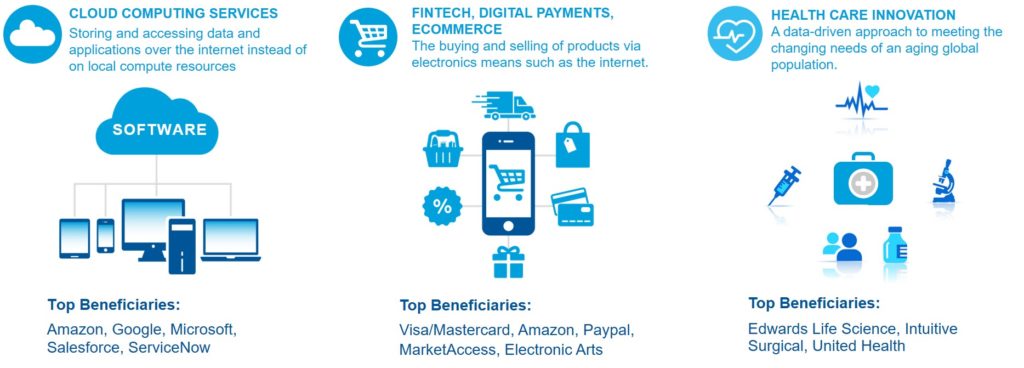
By Grant Bowers, Franklin Templeton Canada
(Sponsor Content)
The economic downturn caused by the global COVID-19 pandemic is accelerating major themes in digital transformation as businesses and workers adjust to new ways of providing goods and services. This acceleration of trends is creating opportunities for investors in the equities of U.S. companies in sectors such as technology, health care and pharmaceuticals.
There are pockets of opportunity now in U.S. equities for selective investors and if you can look through the near-term uncertainty, you can buy great long-term companies at good prices.
The technology sector has benefitted during the shift to a “work from home” environment: especially products and services related to cloud computing, remote access, digital payments, and online security. This technology is in higher demand as individuals, companies and organizations rely on technology to work, communicate with clients and staff, and perform transactions in a virtual platform during pandemic restrictions. The COVID-19 crisis is also highlighting the powerful combination of technology and health care in areas like gene sequencing and data analytics, which will benefit pharmaceutical and biotech firms in the future.
Outlook for U.S. economy
Overall, the U.S. economy likely will remain affected by weakness driven by the pandemic for some time, but the economy should begin to show improvement in the fourth quarter, accelerating into 2021. Decisive stimulus actions taken by the U.S. Federal Reserve will likely help bridge the downturn for many businesses and consumers.
If progress is made on developing a medical treatment for the coronavirus — including a vaccine — then there could be a fairly rapid “healing of the U.S. economy” and a rebound of pent-up consumer demand when restrictions are loosened.
A health care crisis needs a health care solution: there is a massive research effort under way to develop an effective medical treatment of the coronavirus.
Positioned for opportunities in trend acceleration
 As the digital technology transformation advances, companies in some of the most innovative sectors of the U.S. economy are positioned for growth during the downturn. For example, we see opportunities in the wireless tower space as part of the wider shift to 5G wireless technology and the increased focus on data usage and mobility for individuals and businesses. Providers of software for back-office business processes, which are essential for workers at home during the crisis, are another opportunity.
As the digital technology transformation advances, companies in some of the most innovative sectors of the U.S. economy are positioned for growth during the downturn. For example, we see opportunities in the wireless tower space as part of the wider shift to 5G wireless technology and the increased focus on data usage and mobility for individuals and businesses. Providers of software for back-office business processes, which are essential for workers at home during the crisis, are another opportunity.
Also, the semiconductor sector should benefit from increased investments in data centers, which are integral for cloud computing systems. In this environment, our team on the Franklin U.S. Opportunities Fund, who are based in Silicon Valley, focuses on identifying opportunities in growth areas such as cloud computing, e-commerce, financial technology (fintech), and health care.
Franklin U.S. Opportunities Fund: Investment themes for the next decade
These are long-term investment themes the team believed in prior to the crisis and the pandemic has only reinforced their importance for the future. Franklin U.S. Opportunities Fund has an overweight position in software stocks that support digital transformation, and recently deployed cash reserves to add positions in technology and health care. With stellar performance even during the recent downturn, the Fund has outperformed its peers in the crowded U.S. equity category consistently over all time periods.1
These trends will be major parts of the portfolio going forward: We invest in high-quality U.S. companies that are doing business in transformative areas, which makes them well positioned for the inevitable economic recovery.
Learn more about opportunities in U.S. equities during the digital transformation at franklintempleton.ca.
Grant Bowers is senior vice president and portfolio manager with Franklin Equity Group in San Mateo, California. Franklin Equity Group is based in Silicon Valley and has a proven track record of identifying strong, innovative companies in rapidly evolving areas such as cloud computing, e-commerce, digital payments and health care. Mr. Bowers is a portfolio manager with Franklin U.S. Opportunities Fund and related portfolios. He is also a member of Franklin Equity Group’s U.S. Growth team. He joined Franklin Templeton in 1993 as a fixed income analyst.
1. As of May 31, 2020, the historical annual compounded rates of return for Series F units of Franklin U.S. Opportunities Fund vs. Morningstar U.S. Equity Category Average are: YTD 16.65% vs. -2.49%, 1 year 26.26% vs. 9.50%; 3 years 16.64% vs. 7.79%; 5 years 13.65% vs. 8.67%, 10 years 15.48% vs. 13.06% and 4.60% vs. 3.73% since inception (11/24/00). These include changes in unit value and reinvestment of all distributions but do not take into account sales, redemption, distribution or optional charges or income taxes payable by any unitholder which may have reduced returns. Sources: Franklin Templeton and Morningstar Research Inc. Important Legal Information Series F is available to investors participating in programs that do not require Franklin Templeton to incur distribution costs in the form of trailing commissions to dealers. As a consequence, the management fee on Series F is lower than on Series A. © 2020 Morningstar Inc. All Rights Reserved. The information contained herein: (1) is proprietary to Morningstar and/or its content providers; (2) may not be copied or distributed; and (3) is not warranted to be accurate, complete or timely. Neither Morningstar nor its content providers are responsible for any damages or losses arising from any use of this information. Past performance is no guarantee of future results. Commissions, trailing commissions, management fees and expenses all may be associated with mutual fund investments. Please read the prospectus or fund facts document before investing. The indicated rates of return are historical annual compounded total returns including changes in unit value and reinvestment of all distributions and do not take into account sales, redemption, distribution or optional charges or income taxes payable by any securityholder that would have reduced returns. Mutual funds are not guaranteed, their values change frequently, and past performance may not be repeated. This material is intended to be of general interest only and should not be construed as individual investment advice, recommendation or solicitation to buy, sell or hold any security or to adopt any investment strategy. It does not constitute legal or tax advice. The comments, opinions and analyses are rendered as at publication date and may change without notice. The information provided in this material is not intended as a complete analysis of every material fact regarding any country, region or market. Data from third party sources may have been used in the preparation of this material and Franklin Templeton (“FT”) has not independently verified, validated or audited such data. FT accepts no liability whatsoever for any loss arising from use of this information and reliance upon the comments, opinions and analyses in the material is at the sole discretion of the user. All investments involve risks, including the possible loss of principal. Investments in foreign securities involve special risks including currency fluctuations, economic instability and political developments. Investments in emerging markets, of which frontier markets are a subset, involve heightened risks related to the same factors, in addition to those associated with these markets’ smaller size, lesser liquidity and lack of established legal, political, business and social frameworks to support securities markets. Because these frameworks are typically even less developed in frontier markets, as well as various factors including the increased potential for extreme price volatility, illiquidity, trade barriers and exchange controls, the risks associated with emerging markets are magnified in frontier markets. Equity and Fixed Income prices fluctuate, sometimes rapidly and dramatically, due to factors affecting individual companies, particular industries, sectors, or general market conditions. Franklin Equity Group is part of Franklin Templeton Investments Corp. Franklin Templeton Canada is a business name used by Franklin Templeton Investments Corp.


